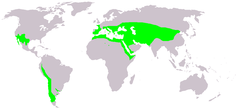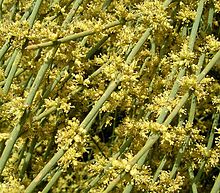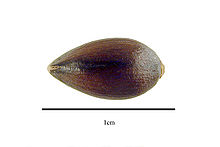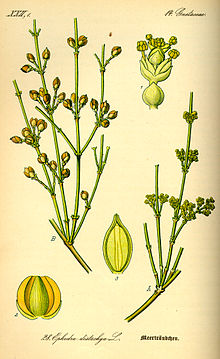- Ephedra (genus)
-
This article is about the genus Ephedra. For the use of the plant in medicine, see Ephedra.
Ephedra 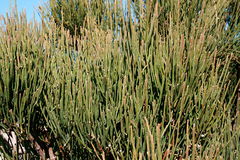
Ephedra fragilis in Mallorca Scientific classification Kingdom: Plantae Division: Gnetophyta Class: Gnetopsida Order: Ephedrales Family: Ephedraceae Genus: Ephedra
L.Species See text.
Distribution Ephedra is a genus of gymnosperm shrubs, the only genus in its family, Ephedraceae, and order, Ephedrales. Ephedra grows in dry climates over wide areas of the northern hemisphere, including southwestern North America, Europe, north Africa, and southwest and central Asia, and, in the southern hemisphere, in South America south to Patagonia. In temperate climates, most Ephedra species grow on shores or in sandy soils with direct sun exposure. Common names in English include Joint-pine, Jointfir, Mormon-tea or Brigham Tea. The Chinese name is mahuang (simplified Chinese: 麻黄; traditional Chinese: 麻黃; pinyin: máhuáng; Wade–Giles: ma-huang; literally "cannabis yellow"). Ephedra is also sometimes called sea grape (from the French raisin de mer), a common name for the flowering plant Coccoloba uvifera.
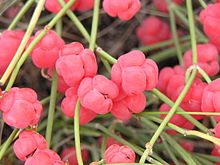 Ephedra distachya: ripe female cones with seeds
Ephedra distachya: ripe female cones with seeds
Contents
Medical uses
Main article: EphedraPlants of the Ephedra genus, including E. sinica and others, have traditionally been used by indigenous people for a variety of medicinal purposes, including treatment of asthma, hay fever, and the common cold.[1] The alkaloids ephedrine and pseudoephedrine are active constituents of E. sinica and other members of the genus. These compounds are sympathomimetics with stimulant and decongestant qualities and are related chemically to the amphetamines.
Pollen of Ephedra spp. was found in the Shanidar IV burial site in Iraq, suggesting its use as a medicinal plant dates to over 60,000 years ago.[2] It has been suggested that Ephedra may be the Soma plant of Indo-Iranian religion.[3]
Species
- Ephedra alata Decne
- Ephedra altissima Desf.
- Ephedra americana Humb. & Bonpl. ex Willd.[4]
- Ephedra antisyphilitica Berl. ex C.A.Meyer – Clapweed, Erect Ephedra
- Ephedra aspera Engelm. ex S.Wats. – Boundary Ephedra, Pitamoreal
- Ephedra boelckei F.A.Roig
- Ephedra californica S.Wats. – California Ephedra, California Jointfir
- Ephedra campylopoda C.A.Mey.[4]
- Ephedra chilensis C.Presl.[4]
- Ephedra ciliata Fisch. ex C.A.Mey.[4]
- Ephedra coryi E.L.Reed – Cory's Ephedra
- Ephedra cutleri Peebles – Navajo Ephedra, Cutler's Ephedra, Cutler Mormon-tea, Cutler's Jointfir
- Ephedra dahurica Turcz.[5]
- Ephedra distachya L. – Joint-pine, Jointfir
- Ephedra equisetina Bunge – Ma huang
- Ephedra fasciculata A.Nels. – Arizona Ephedra, Arizona Jointfir, Desert Mormon-tea
- Ephedra fedtschenkoae Pauls.
- Ephedra foliata Boiss. ex C.A.Mey.
- Ephedra fragilis Desf.
- Ephedra fragilis subsp. campylopoda (C.A.Meyer) Aschers. & Graebn.
- Ephedra frustillata Miers – Patagonian Ephedra
- Ephedra funerea Coville & Morton – Death Valley Ephedra, Death Valley Jointfir
- Ephedra gerardiana Wallich ex C.A.Meyer – Gerard's Jointfir, Shan Ling Ma Huang
- Ephedra holoptera Riedl
- Ephedra intermedia Schrenk ex C.A.Meyer
- Ephedra lepidosperma C.Y.Cheng
- Ephedra likiangensis Florin
- Ephedra lomatolepis Shrenk
- Ephedra macedonica Kos.
- Ephedra major Host
- Ephedra major subsp. procera Fischer & C.A.Meyer
- Ephedra minuta Florin
- Ephedra monosperma C.A.Meyer
- Ephedra multiflora Phil. ex Stapf
- Ephedra nevadensis S.Wats. – Nevada Ephedra, Nevada Jointfir, Nevada Mormon-tea
- Ephedra pachyclada Boiss.[4]
- Ephedra pedunculata Engelm. ex S.Wats. – Vine Ephedra, Vine Jointfir
- Ephedra procera Fisch. & C. A. Mey.[4]
- Ephedra przewalskii Stapf
- Ephedra przewalskii var. kaschgarica (B.Fedtsch. & Bobr.) C.Y.Cheng
- Ephedra regeliana Florin – Xi Zi Ma Huang
- Ephedra saxatilis (Stapf) Royle ex Florin
- Ephedra sinica Stapf – Cao Ma Huang, Chinese ephedra
- Ephedra strobilacea Bunge[4]
- Ephedra torreyana S.Wats. – Torrey's Ephedra, Torrey's Jointfir, Torrey's Mormon-tea, Cañutillo
- Ephedra trifurca Torrey ex S.Wats. – Longleaf Ephedra, Longleaf Jointfir, Longleaf Mormon-tea, Popotilla, Teposote
- Ephedra viridis Coville – Green Ephedra, Green Mormon-tea
Economic botany and alkaloid content
Earliest uses of Ephedra spp. (Ma Huang) for specific illnesses date back to 5000 BC. Ephedrine and isomers were already isolated in 1881 from Ephedra dystachia and characterized by the Japanese organic chemist Nagai Nagayoshi of the 19th century. His work to access Ephedra drug materials to isolate a pure pharmaceutical substance, and the systematic production of semi-synthetic derivatives thereof is relevant still today as the three species Ephedra sinica, Ephedra vulgaris and to a lesser extend Ephedra equisetina are commercially grown in Mainland China as a source for natural ephedrines and isomers for use in pharmacy. The application of botanical extracts from Ma Huang as a stimulant and anorexic drug has no validity in either TCM or modern Western medicine. E. sinica and E. vulgaris carry usually six optically active phenylethylamines, mostly ephedrine and pseudoephedrine with minor amounts of norephedrine, norpseudoephedrine as well as the three methylated analogs. Reliable information on the total alkaloid content of the crude drug is difficult to obtain. Based on HPLC analyses in industrial settings, the concentrations of total alkaloids in dried Herba Ephedra ranged between 1 to 4%, and in some cases up to 6%.[6]
For a review of the alkaloid distribution in different species of the genus Ephedra see Jian-fang Cui (1991).[7] Other American and European species of Ephedra, e.g. Ephedra nevadensis (Mormon tea) have not been systematically assayed; based on unpublished field investigations, they contain very low levels (less than 0.1%) or none at all.[citation needed]
Cultural reference
Represents the provincial flower of Balochistan (Pakistan) (unofficial).[citation needed]
References
- ^ Abourashed E, El-Alfy A, Khan I, Walker L (2003). "Ephedra in perspective--a current review". Phytother Res 17 (7): 703–12. doi:10.1002/ptr.1337. PMID 12916063.
- ^ Shanidar IV, a Neanderthal Flower Burial in Northern Iraq Ralph S. Solecki Science New Series, Vol. 190, No. 4217 (Nov. 28, 1975), pp. 880-881 Published by: American Association for the Advancement of Science Stable URL: http://www.jstor.org/stable/1741776
- ^ Rudgley, Richard (1993). The Alchemy of Culture. London: British Museum Press. pp. 44–45. ISBN 0-7141-2711-6.
- ^ a b c d e f g h i "Species in GRIN for genus". www.ars-grin.gov. http://www.ars-grin.gov/cgi-bin/npgs/html/splist.pl?4296. Retrieved 2008-05-03.
- ^ Ephedraceae Ephedra dahurica Turcz. International Plant Names Index
- ^ Arnold Brossi(ed) (1989), The Alkaloids: Chemistry and Pharmacology Vol. 35 ISBN 0-12-469535-3
- ^ Jian-fang Cui et al. (1991). Analysis of alkaloids in Chinese Ephedra species by GC methods. Phytochemical Analysis, Vol 2: 116-119.
External links
Categories:- Gnetophyta
- Medicinal plants
- Plants used in Traditional Chinese medicine
Wikimedia Foundation. 2010.

